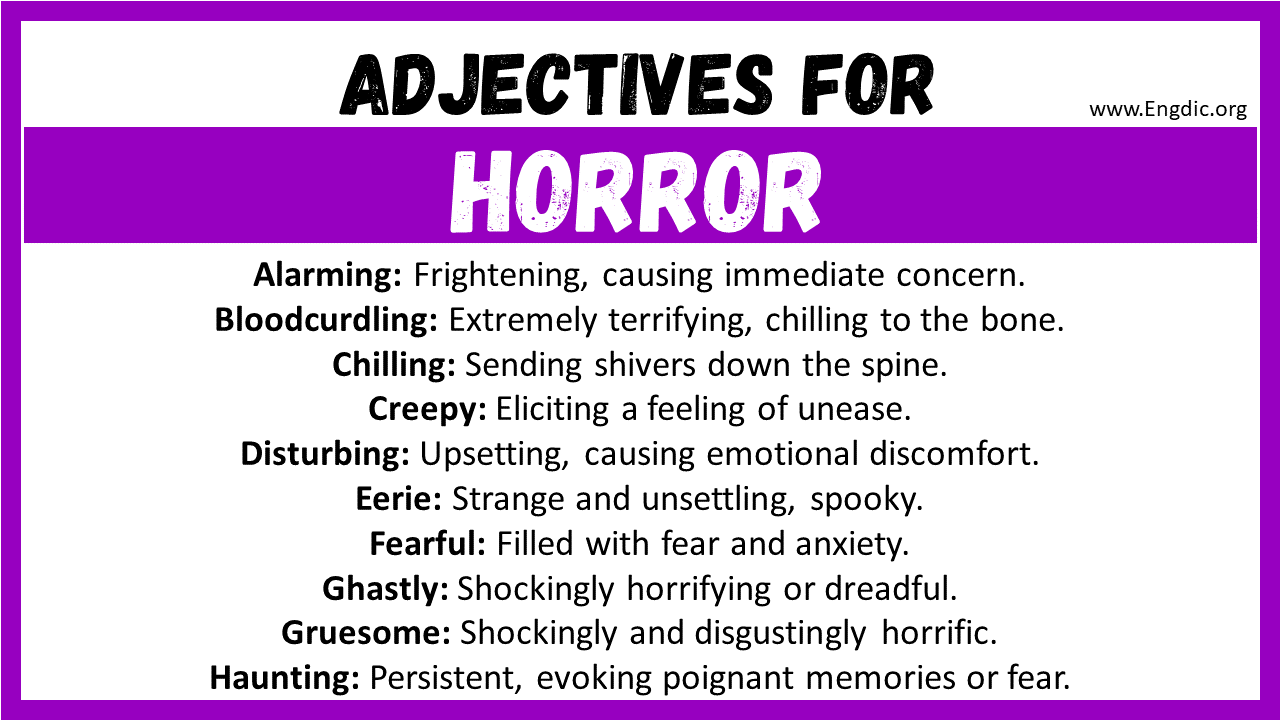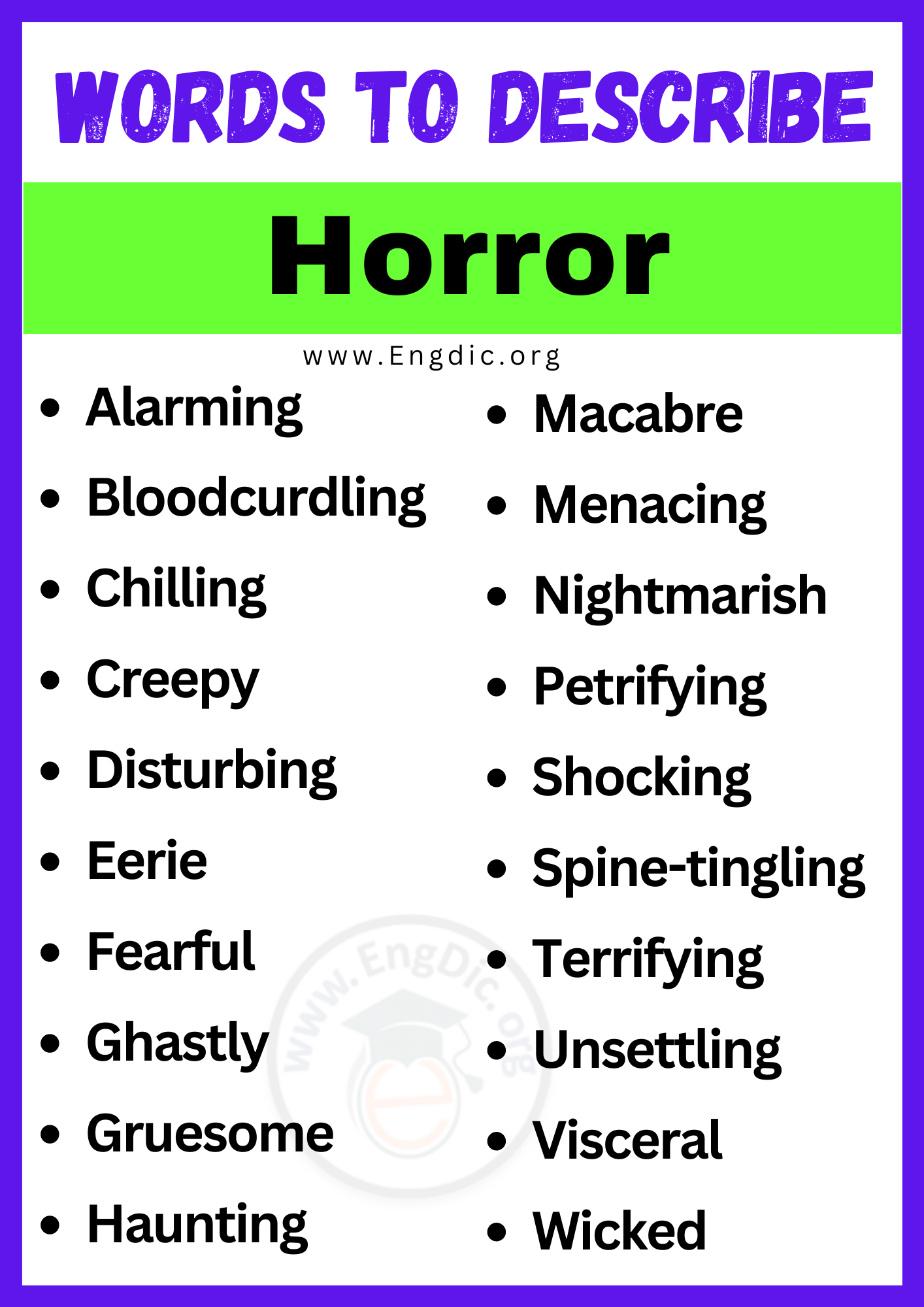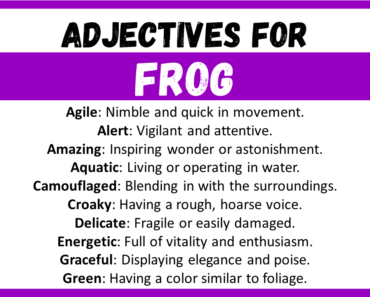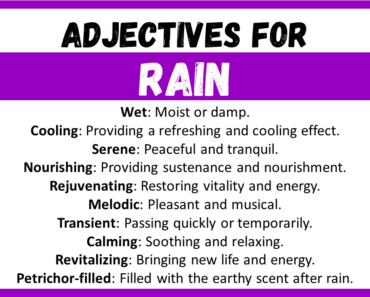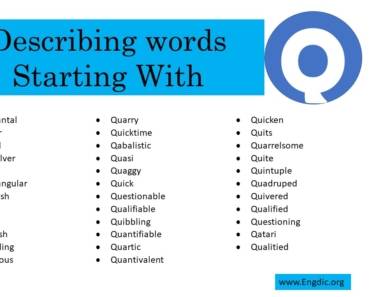Horror, in its essence, is an intense feeling of fear, dread, and suspense that captivates and chills us to the core. It is a genre that delves into the unknown and explores our deepest fears, often in supernatural or terrifying settings. To convey the spine-tingling experience of horror, writers, and filmmakers employ a rich array of descriptive words. From bone-chilling and eerie to sinister and macabre, these words paint vivid pictures of the frightful scenarios that unfold, leaving an indelible mark on our minds.
Adjectives for Horror
Here are the 20 Most Popular adjectives for horror:
- Alarming
- Bloodcurdling
- Chilling
- Creepy
- Disturbing
- Eerie
- Fearful
- Ghastly
- Gruesome
- Haunting
- Macabre
- Menacing
- Nightmarish
- Petrifying
- Shocking
- Spine-tingling
- Terrifying
- Unsettling
- Visceral
- Wicked
Adjectives for Horror Stories:
- Terrifying
- Chilling
- Gruesome
- Haunting
- Eerie
- Macabre
- Spine-tingling
- Nightmarish
- Hair-raising
- Bloodcurdling
Adjectives for Horror Movies:
- Frightening
- Suspenseful
- Bone-chilling
- Shocking
- Unsettling
- Creepy
- Disturbing
- Gory
- Petrifying
- Tense
Words to Describe Horror with Meanings
- Alarming: Frightening, causing immediate concern.
- Bloodcurdling: Extremely terrifying, chilling to the bone.
- Chilling: Sending shivers down the spine.
- Creepy: Eliciting a feeling of unease.
- Disturbing: Upsetting, causing emotional discomfort.
- Eerie: Strange and unsettling, spooky.
- Fearful: Filled with fear and anxiety.
- Ghastly: Shockingly horrifying or dreadful.
- Gruesome: Shockingly and disgustingly horrific.
- Haunting: Persistent, evoking poignant memories or fear.
- Macabre: Dealing with death, gruesome and eerie.
- Menacing: Threatening, suggesting danger or harm.
- Nightmarish: Resembling a horrifying dream or nightmare.
- Petrifying: Paralyzing with fear, terrifying.
- Shocking: Causing a sudden jolt of fear.
- Spine-tingling: Provoking a shivering sensation of fear.
- Terrifying: Filling with extreme fear and terror.
- Unsettling: Causing unease and discomfort.
- Visceral: Deeply felt, instinctive and intense.
- Wicked: Evil and malevolent, morally wrong.
Example Sentences for Horror Adjectives
- The alarming sound echoed through the deserted mansion.
- Her bloodcurdling scream pierced the silence of the night.
- The chilling wind made the old house creak.
- The creepy doll gave me goosebumps.
- The movie’s ending was disturbing and unexpected.
- The forest had an eerie atmosphere after dark.
- She had a fearful expression on her face.
- The horror movie depicted ghastly scenes of violence.
- The crime scene was too gruesome to look at.
- The haunting melody lingered in his mind.
- The abandoned asylum had a macabre history.
- His menacing gaze sent shivers down her spine.
- I woke up from a nightmarish dream.
- The petrifying moment froze me in fear.
- The plot twist was shocking and unexpected.
- The haunted house gave us a spine-tingling experience.
- The clown costume was terrifying the children.
- The abandoned cemetery was an unsettling sight.
- The horror movie had a visceral impact on the audience.
- The witch’s wicked laugh echoed in the darkness.
Explore More Words:
Words to Describe Thunderstorm
FAQ’s
How to describe horror in writing?
Describe horror in writing by evoking intense fear, suspense, and chilling imagery to captivate readers with a sense of dread and terror.
What is the adjective of horrifying?
The adjective of horrifying is “horrifying” itself, which means causing extreme fear or shock.
What are adverbs for scary?
Adverbs for scary include “terrifyingly,” “frighteningly,” “chillingly,” “spine-tinglingly,” and “eerie,” intensifying the sense of fear in different contexts.
